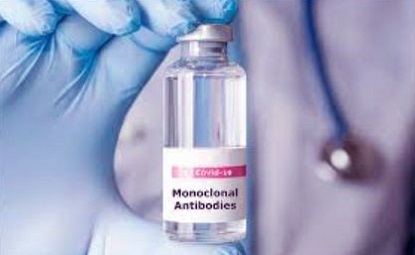Malaysian Study Finds That Monoclonal Antibodies Used to Treat COVID-19 Are Actually Hepatotoxic and Cause Neutropenia!
Nikhil Prasad Fact checked by:Thailand Medical News Team Mar 08, 2025 1 month, 5 days, 8 hours, 19 minutes ago
Medical News: A Startling Discovery in COVID-19 Treatment and the Long-term Adverse Effects
A groundbreaking study from Malaysia has shed light on alarming health risks associated with monoclonal antibodies (mAbs) used for COVID-19 treatment. Conducted by researchers from the School of Medicine, IMU University in Kuala Lumpur, this systematic review and meta-analysis found that several widely used monoclonal antibodies, including tocilizumab, sarilumab, casirivimab, imdevimab, sotrovimab, and bamlanivimab, are linked to severe adverse effects, including hepatotoxicity (liver toxicity), neutropenia (a severe reduction in white blood cells), renal toxicity (kidney damage), and other potentially life-threatening conditions. These findings raise serious concerns about the long-term safety of these treatments, particularly for vulnerable patients with pre-existing health conditions.
 Malaysian Study Finds That Monoclonal Antibodies Used to Treat COVID-19
Malaysian Study Finds That Monoclonal Antibodies Used to Treat COVID-19
Are Actually Hepatotoxic and Cause Neutropenia
Research Background and Methodology
The study aimed to comprehensively analyze the adverse effects associated with monoclonal antibodies in COVID-19 treatment. The research team conducted a systematic review and meta-analysis of clinical trials published between January 2020 and September 2023, focusing on randomized controlled trials (RCTs). A total of 16 studies met the inclusion criteria, covering 19,797 participants - 9,682 in the intervention group (receiving mAbs) and 10,115 in the control group (receiving standard care or placebo).
This
Medical News report highlights that the researchers employed rigorous screening methodologies, including the Cochrane risk of bias 1.0 tool, to ensure accuracy. By analyzing data related to liver toxicity, neutropenia, renal toxicity, and other adverse effects, the study aimed to determine the risk-benefit balance of monoclonal antibody treatments. The findings suggest that while these drugs were effective in reducing some disease-related complications, they also posed substantial risks that could not be ignored.
Monoclonal Antibodies Examined in the Study
The study analyzed the safety profiles of multiple monoclonal antibodies that were either repurposed or newly developed for COVID-19 treatment. These included:
-Tocilizumab (IL-6 receptor inhibitor)
-Sarilumab (IL-6 receptor inhibitor)
-Casirivimab and Imdevimab (REGEN-COV) (target SARS-CoV-2 spike protein)
-Sotrovimab (neutralizing antibody targeting SARS-CoV-2)
-Bamlanivimab (neutralizing antibody targeting SARS-CoV-2 spike protein)
While some of these mAbs were granted Emergency Use Authorization (EUA) during the pandemic, their long-term safety had not been extensively studied at the time of approval. The findings of this study now raise important questions about their continued use.
Key Findings: A Significant Increase in Adverse Effects
The study found several seri
ous adverse effects associated with monoclonal antibody treatments:
-Hepatotoxicity (Liver Toxicity): Seven trials reported a statistically significant increase in liver damage among patients receiving monoclonal antibodies. Elevated liver enzyme levels, indicative of liver stress or injury, were noted in a significant percentage of patients (Risk Ratio [RR] = 1.70, 95% Confidence Interval [CI] 1.29–2.24).
-Neutropenia (Low White Blood Cell Count): Five trials found that patients receiving monoclonal antibodies were four times more likely to develop neutropenia compared to those who did not receive the treatment (RR = 4.03, 95% CI 1.74–9.34). This condition increases susceptibility to severe infections, which can be fatal in immunocompromised patients.
-Renal Toxicity (Kidney Damage): Two trials reported significant kidney-related complications in patients receiving mAbs. The pooled data showed no statistically significant increase in overall renal toxicity (RR = 1.03, 95% CI 0.2–5.18), but individual case studies highlighted incidents of acute kidney injury, particularly among those treated with tocilizumab and sarilumab.
-Infusion-Related Reactions: Four trials with 3,024 participants found that mAbs increased the likelihood of infusion reactions such as severe allergic responses, fever, and chills, although the difference was not statistically significant (RR = 1.21, 95% CI 0.63–2.34).
-Serious Adverse Events (SAEs): While mAbs slightly reduced the risk of disease-related SAEs such as septic shock, viral sepsis, and acute respiratory distress syndrome (ARDS), this reduction was not statistically significant (RR = 0.88, 95% CI 0.70–1.11).
Mechanisms Behind These Adverse Effects
The study explored potential mechanisms contributing to these adverse events:
-Liver Toxicity: Monoclonal antibodies such as tocilizumab and sarilumab inhibit IL-6, a cytokine essential for liver regeneration. This interference can lead to hepatic injury, increased liver enzyme levels, and, in severe cases, liver failure.
-Neutropenia: Tocilizumab and sarilumab disrupt neutrophil production and circulation, leading to a higher risk of infections. This condition is particularly concerning for hospitalized patients requiring intensive care.
-Kidney Damage: Some monoclonal antibodies cause direct nephrotoxicity, while others induce inflammatory responses that can exacerbate kidney injury in critically ill patients.
Implications for COVID-19 Treatment and Future Research
The findings of this Malaysian study call for a reassessment of the use of monoclonal antibodies in COVID-19 treatment. Initially celebrated as a breakthrough in managing severe cases, these therapies now appear to carry significant risks that warrant closer scrutiny. Regulatory bodies such as the FDA, WHO, and EMA may need to reconsider their recommendations regarding these treatments.
Healthcare providers are urged to closely monitor patients receiving mAbs, especially those with pre-existing liver, kidney, or immune-related conditions. The researchers strongly advocate for long-term observational studies to assess post-COVID adverse effects associated with monoclonal antibody treatments.
Conclusion: Balancing Benefits and Risks
The study from Malaysia provides valuable insight into the hidden dangers of monoclonal antibodies used for COVID-19 treatment. While these drugs have helped many patients recover from severe symptoms, their potential to cause life-threatening side effects cannot be overlooked.
The research highlights the need for ongoing surveillance and evaluation of COVID-19 treatments to ensure patient safety. Moving forward, medical professionals and policymakers must adopt a more cautious approach when prescribing these therapies. Alternative treatment options with safer profiles should be explored, and patients should be fully informed of the risks associated with these drugs.
The study findings were published in the peer-reviewed British Journal of Clinical Pharmacology.
https://bpspubs.onlinelibrary.wiley.com/doi/10.1002/bcp.70025
For the latest COVID-19 News, keep on logging to Thailand
Medical News.
Read Also:
https://www.thailandmedical.news/news/favipiravir-that-was-used-to-treat-covid-19-actually-causes-lung-inflammation-lung-damage-and-lung-fibrosis
https://www.thailandmedical.news/news/covid-19-drugs-university-of-oxford-study-shows-that-molnupiravir-does-not-reduce-hospitalization-or-deaths-in-vaccinated-adults-with-covid-19
https://www.thailandmedical.news/news/breaking-covid-19-news-researchers-warn-that-molnupiravir-is-driving-rapid-evolution-of-sars-cov-2-variants-and-causing-mutations
https://www.thailandmedical.news/news/study-finds-that-u-s-fda-s-approved-remdesivir-is-hepatoxic
https://www.thailandmedical.news/news/breaking-news-nirmatrelvir-in-covid-19-antiviral-paxlovid-impairs-sperm-function
https://www.thailandmedical.news/articles/coronavirus
https://www.thailandmedical.news/pages/thailand_doctors_listings
https://www.thailandmedical.news/pages/thailand_hospital_listings
https://www.thailandmedical.news/articles/hospital-news
